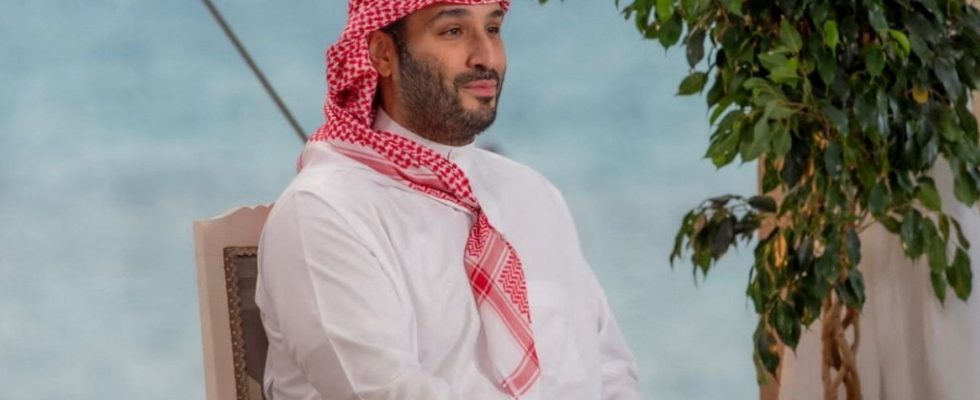Putting the Saudi crown prince in front of a camera and asking him uncomfortable questions – that doesn’t happen every day. The 38-year-old Mohammed bin Salman, also known as MbS, is the ruler of an increasingly important country who is controversial in the West and celebrated by many compatriots and is not exactly known for his transparency. On the contrary: MbS decides what the world should know about him. Now he gave an interview to the right-wing conservative US television channel Fox News, which was broadcast on Wednesday evening.
Interviewer Bret Baier, who, unlike Mohammed bin Salman, stands out because of his almost stony facial expressions, discusses foreign policy topics, peppered with a few flatteries (“You really think unconventionally when it comes to your deals”). When asked about the rapprochement with the former arch-enemy Iran, which was viewed critically in Washington, MbS initially seemed unprepared. To then coolly explain: If there is an opportunity for shared prosperity, then we want to use it. “Why not?”
If Iran gets the atomic bomb, MbS wants one too
He answers the question about Iran’s nuclear armament in a similarly pragmatic manner. “It’s a useless effort to develop nuclear weapons because you can’t use them,” says MbS. Because any country that uses nuclear weapons would be at war with the rest of the world. If Tehran obtains a nuclear bomb, Saudi Arabia would have to do the same, he says. “But we don’t want that.”
With a view to a possible rapprochement with Israel, MbS emphasizes that the lives of the Palestinians must become easier. He does not reveal exactly what Israel’s concessions to the Palestinians will look like. However, we get closer every day, says MbS. Could a deal be made with Israeli Prime Minister Benjamin Netanyahu and his right-wing coalition members? The Crown Prince explained that no one would interfere in the internal affairs of the countries who were now in power. A standard swipe at the West, which is always accused of exactly that. If the “biggest historic deal since the end of the Cold War” is about to happen, MbS explains, then this relationship will emerge and endure, regardless of who is in charge.
During the election campaign, US President Joe Biden would be only too happy to portray himself as the broker of a normalization agreement between the Saudis and Israelis. What does MbS hope for in return? He responds with a reminder to the US Congress, which likes to block arms exports to Riyadh: Saudi Arabia is the US’s largest arms buyer, not only Riyadh would benefit from a defense pact, the US role in the region could also be strengthened again – You don’t want that to change in the future. It would “save the Saudi side effort and headache” not to have to shift its defense spending to other weapons suppliers – a clear warning that it may look further east in the future.
A little later, however, MbS emphasized that membership in the Brics alliance, which is dominated by China and Russia, was not a political decision against the West. But at the same time you can hear disappointment and defiance when he says that Saudi Arabia tried to join the G-7 group during Donald Trump’s US presidency, but it had “requirements from some countries” (MbS’s eyebrows jump above) that stood in the way. The message behind it is clear: you don’t want us, Brics does, your bad luck.
Sportswashing? “I don’t care.”
What makes MbS tick becomes particularly clear when it comes to the accusation of “sportswashing”, i.e. washing away a bad image through glamorous sporting events. MbS basically says: If we make money with it, then call it whatever you want. “I don’t care.” He throws around numbers; Bret Baier calls him a “data guy” because MbS is apparently mainly excited about how quickly Saudi Arabia’s economy is currently growing.
The Crown Prince repeatedly uses the same slogans: stability, growth, prosperity for the entire region – because everything else brings unrest, including for the rest of the world, as we have seen: IS, al-Qaeda, terrorist attacks. When asked about the injustices in his own country, MbS naturally refers to the Saudi justice system – he has the last word in the kingdom. The interviewer cites the case of a man who is facing the death penalty for writing posts critical of the government online. The Crown Prince asserts that he is doing his best to change existing laws – here too he senses Western paternalism and, in a side note, recalls the US crimes in Iraq. He makes it clear that they are working on laws that are realistic for Saudis, not for foreigners. “Do we have bad laws? Yes. Do we change them? Yes.”
The interview ends with the attitude of a young ruler who is aware of the importance of his country in every pore. What advice would he give to hesitant visitors from abroad? “Saudi Arabia is the biggest success story of the 21st century. Do you want to miss it or not? That’s your decision,” says MbS and at the end puts on his broadest grin of the entire half hour.

